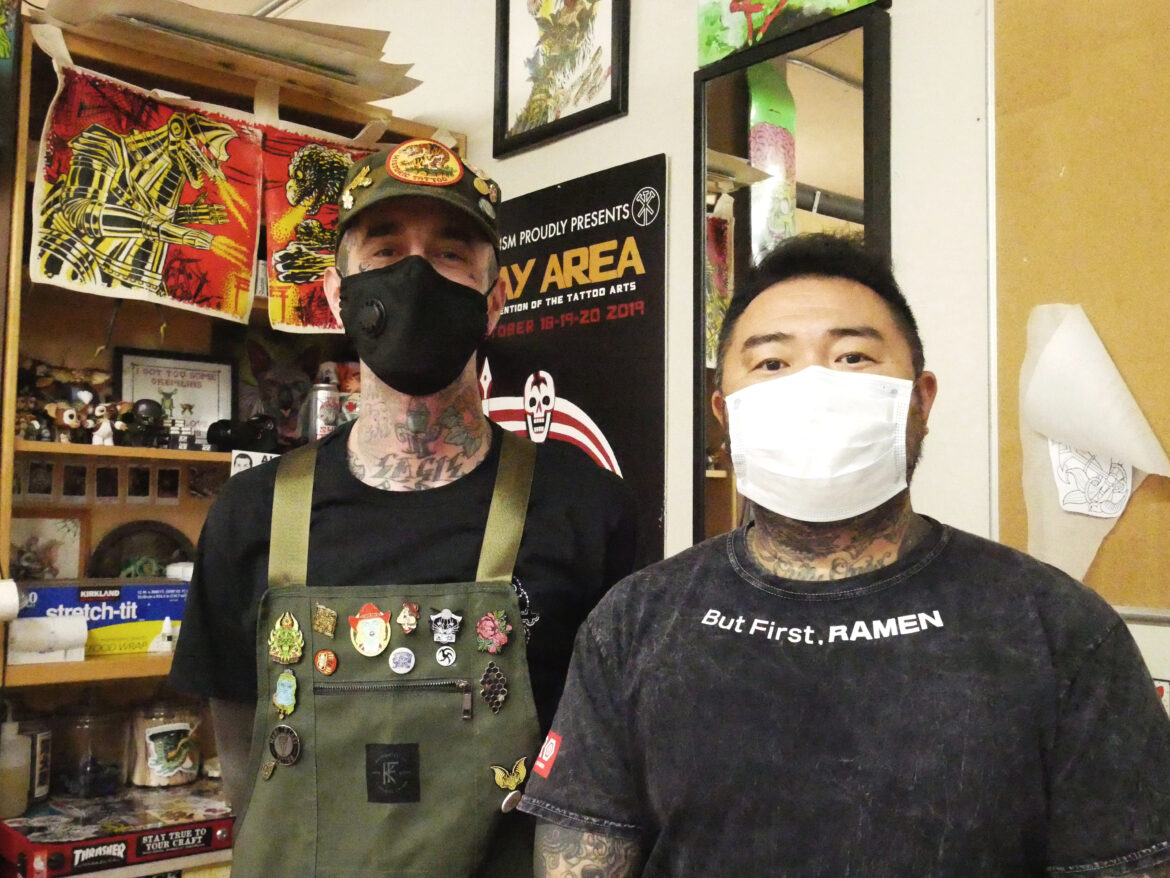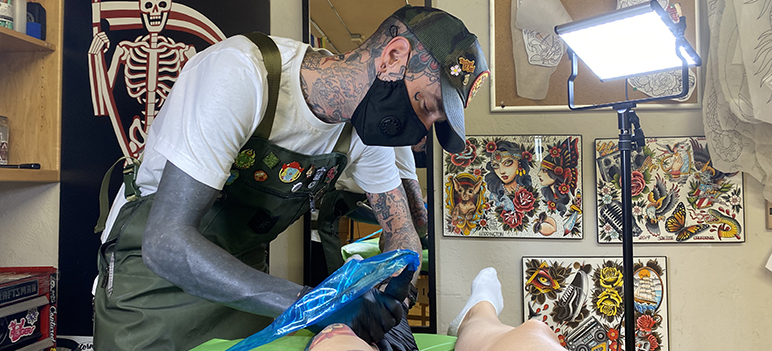Tyler Harrington cleared cobwebs and dust collected in the 178 days he was barred from plying his craft at State of Grace Tattoo from the Gremlins action figures adorning his corner workstation. The retro figurines and whimsical decor of his artist’s booth used to evoke his sense of nostalgia.
These days, they seem more like relics of a bygone era, before a pandemic put his tattoo career in limbo and upended his sense of belonging in Silicon Valley.
On Sept. 9, the steady hum of Harrington’s tattoo machine returned to the previously shuttered parlor perched above Shuei-Do Manju Shop, Nikkei Traditions and Kaita Restaurant in San Jose’s historic Japantown.
At least he has plenty of work for the time being. Harrington says prospective clients flooded his email inbox as soon as Santa Clara County public health officials announced earlier this month that tattoo shops would be able to reopen.
The South Bay’s Covid-19 cases have reduced from “widespread” into the “substantial” tier of California’s blueprint for reopening the economy, which allowed businesses in the personal care, fitness and retail industries to start seeing clients and customers—as long as facilities are sufficiently sanitized. Artists who had been scraping by with underground appointments or some other side-hustle can now confidently look ahead, says Takahiro “Taki” Kitamura, who owns State of Grace.
“There's been no lag in people that want to get tattooed, but we're all trying to find that balance for all of us between freedom and safety,” he says. “Honestly, when we’re at work, aside from wearing the extra [protective gear], which you get used to, it feels like nothing’s changed.”
Of course, there’s no business as usual anymore. Appointments now require a temperature check, sanitized hands and release forms, while artists and clients both don masks, aprons and face shields. Though tattoo shops spent months shuttered, the industry is luckier than some—like estheticians and restaurants—that still can’t let customers inside, a rule that has rankled many business owners in the South Bay.
Despite the strict new mandates, Harrington says he’s booked out—and he’s not alone. State of Grace gets a minimum of 10 emails daily, plus calls and Instagram direct messages to snag an appointment with the shop’s seven artists. Artist Colin Baker has 250 people to reschedule when he’s not corralling his young son for distance learning. The already years-long waitlist to go under Horitomo’s needle has resumed.
Harrington admits the 0-to-60mph restart is jarring, but he’s “super fucking grateful” to be welcomed back with open arms he says, his voice slightly muffled through his black filtered mask. “The biggest argument that we had was we were never open, so we were never part of the problem.”
Since the start of the pandemic, public health officials deemed tattoo parlors inessential and ordered them closed. Tattoos have never been considered essential in society, let alone during a pandemic. With no real lobbying power to change that, tattooists spent the ensuing months tinkering with other mediums, selling prints and merch to get by.
That’s what Harrington did.
Once Santa Clara County announced its emergency shutdown in mid-March, the veteran artist settled into quarantine life with his sphinx cat and switched from inking skin to inking paper. He binged murder mystery podcasts and went on a “Covid painting spree” that resulted in 169 pieces.
He livened up Vans shoes, painted an ode to Superbad’s McLovin’ and in one piece brings Baby Yoda to life. Another captures the flow and tension of Shibari bondage. On Instagram, his 49,000 followers praised his artistic dedication.
For Harrington, the paintings were a way to preserve his sanity in the face of so much uncertainty. “You don’t realize how much you miss it until it’s gone,” he says. “This is my life. This is the only reason I’m in San Jose. To have that all taken away … we’re just super grateful to be back.”

Tyler Harrington and Taki Kitamura are back to business at State of Grace. (Photo by Katie Lauer)
Tattooists know all to well public health officials could still reverse course. Earlier this summer, the county green-lit tattoo shops to reopen—only to rescind it 24 hours later.
“Thank god I wasn’t there,” says Harrington, who delayed appointments at State of Grace to catch up on client designs. “The guys here were excited to get back to work, and then halfway through the day, got that message, ‘Close by midnight.’ … It's all weird.”
Questions about the future of tattooing spur Harrington’s anxieties about how much time he has left in San Jose without regular work. Even with revenue from his paintings, commissions and guest tattooing during jaunts to his hometown, Santa Rosa, his income didn’t assure he could afford rent at his San Jose apartment.
Kitamura—a traditional Japanese tattoo artist who’s in charge of managing the business—says he kept busy in recent months by busting chops of local politicians with the power to speed up reopening in so-called non-essential sectors. The pandemic inspired Kitamura’s first foray into civic engagement with a spot on Councilman Raul Peralez’s Greater Downtown Economic Recovery Task Force.
“He has brought that frankness ... where he's not afraid to speak his mind, say something that maybe others are thinking but they're just not sharing,” Peralez says of Kitamura’s influence on the advisory body.
The inherent cleanliness in reputable tattoo shops lends itself well to the pandemic age, Kitamura said. State of Grace already had a stockpile of personal protective gear and the shop’s artists were already educated about blood-borne pathogens to avoid exposure to viruses like Hepatitis B and C, HIV/AIDS and tuberculosis.
Peralez says Kitamura’s insight was invaluable, as elected officials don’t know the ins and outs of running a tattoo shop. But even with the task force recommendations, the reopening of tattoo parlors was at the mercy of the county’s Covid-19 case count.
The first known case of the novel coronavirus in the United States was in Santa Clara County. The case count spiked in April and flattened through May.
A second wave eventually evened out from a peak of 400 new Covid-19 positives a day to an average of 119 this month. California’s “red-tier” status—which allows businesses such as tattooing to open—could be lost if those infection rates worsen in the fall, potentially threatening business’ revenue and income.
Compared to lingering anxieties about browsing the aisles of Safeway, walking around without a mask and dining indoors before 2021, getting ink stabbed into one’s skin is a relatively relaxing event for some. As symbols of freedom and expression, Kitamura says body art holds unique appeal during a time when so much of life seems precarious.
“After everything’s been taken away—our right to work, addictions are happening, selling possessions—you can’t foreclose a tattoo, can’t repossess a tattoo,” he says. “It’s yours.”

